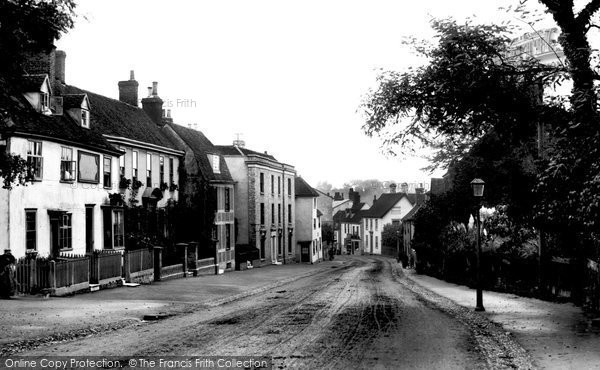Friars Children's Home, 31 Bradford Street, Bocking
A Memory of Bocking.
My mother wrote her childhood memories about 10 years before she died in 1992. She was sent to Friars Children's Home for the sole purpose of working when she was 14 in about 1926. I think that her memories are an important part of the history of the building which was once a children's home but now still stands as the Old Court House Hotel. Her story is a long one but I will condense it to give an understanding of her experience:
"My life began in Poplar, East London. I was born in 1912, the youngest of 6 children. My early knowledge was gathered as I grew up from various people and in particular from my eldest sister. When I was six weeks old my mother vanished - she left for Australia on a boat with a man she had met previously. When I was six months old homes were found for me and my brothers and sisters. In March 1913 we were taken by train to Witham, Essex by a missionary lady and met by Miss Luard whose father was an Admiral. A `mother's meeting' was arranged at the Church Hall where families volunteered to take us." (My mother mentions which families took which children but I will just mention the families names): Mrs Mason, the Postmaster's wife, Mrs Elvin,
Mr and Mrs Wright and Mr and Mrs Lazzell. My mother was taken by Mr and Mrs Joseph Lapwood who had had about 10 children themselves but all grown up. Mr and Mrs Lapwood were in their 60`s.
My mother loved Mrs Lapwood knowing her as the only mother she ever had and not knowing that she wasn't her real mother until much later. Her childhood memories living with Mr and Mrs Lapwood are delightful although they did include some cruelty from other children taunting her and asking where she came from. Her story continues relating to the Children's Home:
"There came a time when mother was quiet and seemingly worried. I was in my teens and soon I would have to leave school. She so needed me but with guardians it was necessary that I be taken away and put into a Home. My two sisters and brother had already been placed in such a home, although I did not know this at the time. All the fighting in the world would not allow mother to hold me any longer. So during Christmas of 1926 I was taken away.
A very severe looking woman, as asst. matron, accompanied me on a train to the Home. It was a large house on Bradford Street in Braintree, Essex. A place I will never forget!! This huge house had gardens at the back and it housed 36 boys and girls from 3 - 15 years old. All were without parents. Some were very loveable, needing care and love, others were very difficult and cruel.
My life had completely changed and I had difficulty getting accustomed to my new surroundings. The matron and her assistant were both unmarried women, plain and quite frightening. After mother, I found this very hard to get used to. There were numerous household chores and for two days each week we did the laundry. The eldest had the responsibility of looking after the little ones, cleaning their heads and brushing their hair for example.
Our food was plain and simple. Bread and jam for breakfast. On Monday's stew would be served and this I could not eat. It would be presented to me several days running but to no avail. The only letters I ever wrote were to mother and these had to be read in front of the matron before posting. It was also necessary that the letters mother wrote to me had to be read aloud in the same manner. It was extremely humiliating but it had to be endured.
Later, I had the bright idea of writing my letters in the Public Gardens when I went shopping and posting them before returning to the Home. Fortunately, it was my job to pick up the mail. What I did was that I would stuff my letters down my neck to be opened later and read when locked in the lavatory."
My mother ends her story here. She did return to her foster mother and was with her when she died age 80, my mother being 20 at the time. Joseph Lapwood died when my mother was about 5 years old. Her father, who couldn't care for his six chlldren, joined the army in 1915 until 1919 survived WW1 but was never seen again by my mother or her brothers and sisters. It was only a few years ago that my family discovered that he died in 1958, and her mother died in Australia in 1961 after having 6 further children. Because of the wonders of the internet my family have traced her Australian descendants.
Add your comment
You must be signed-in to your Frith account to post a comment.
Add to Album
You must be signed in to save to an album
Sign inSparked a Memory for you?
If this has sparked a memory, why not share it here?


Comments & Feedback